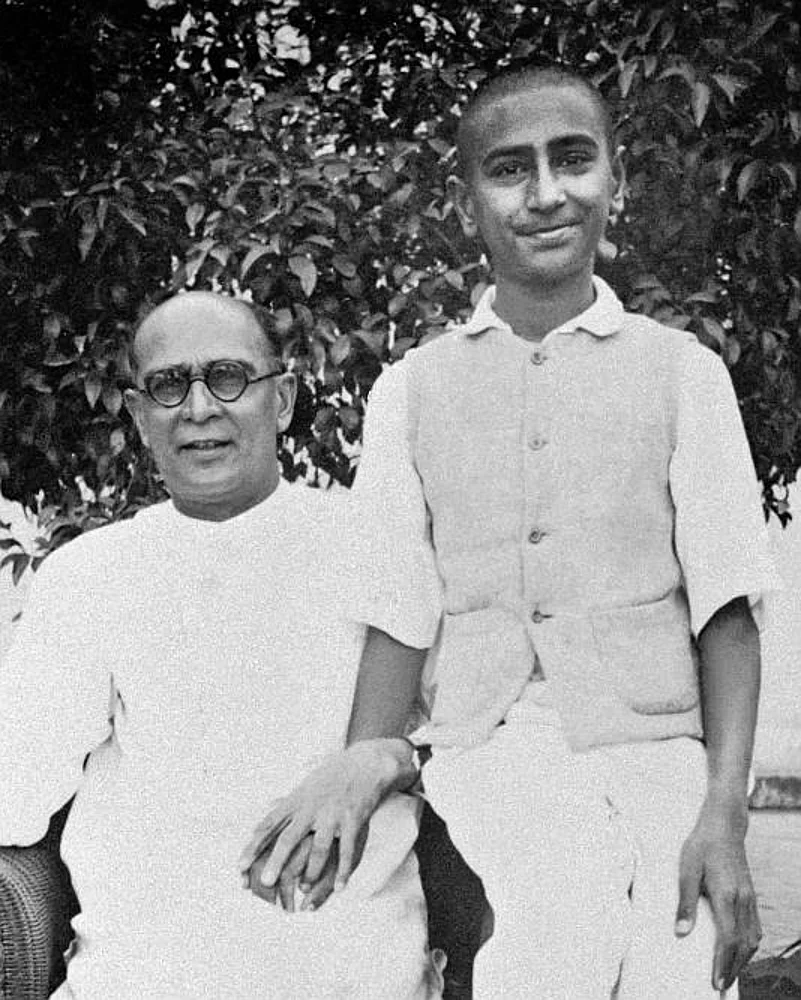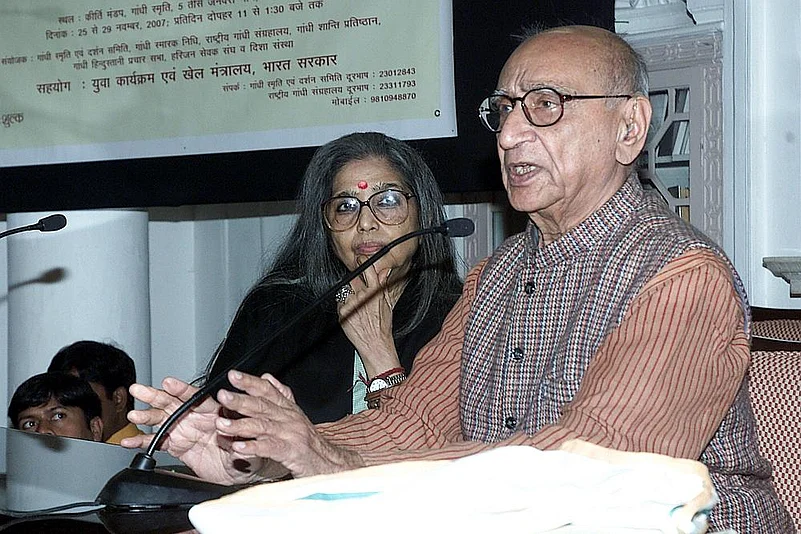Many so-called or self-styled Gandhians preach, but hardly or never practise, what Mohandas K. Gandhi personified — non-violence, simplicity, truthfulness — almost throughout his life. But Narayan Desai, who grew up in front of Gandhi, imbibed all those noble qualities and honestly tried to live them till he breathed his last, aged 90, at his home in Vedchhi in southern Gujarat on March 15. He was the last link with the Mahatma.
Though very young at the time, Desai had a firsthand experience of Gandhi's simple living and commitment and dedication to the causes, both small and big, he had been involved with. Desai was Gandhi's favourite little boy, or "Babla", as the great man affectionately called him, and was among the privileged few who walked and played with the Mahatma. Like most people, Desai also addressed Gandhi as "Bapu" (father).
"I didn't realise then, but today, when I remember those days, I think it was a privilege for me and some other children to walk with Bapu every evening. When free and the mood seized him, he would even play with us sometimes," he had told me during an interview.
"It wasn't easy to walk with Bapu. His pace was just too brisk, not only for children, but also for young men and women. I had to literally run to catch up with him. Bapu knew well that I was unable to match his walking speed. So he would often pull my legs saying: "Hello, Babla, ready for a walk? Let's see how quick you can run!"
When Desai began attending the prayer, during which Gandhi would always sit under a tree, he would fix himself in the Mahatma's lap, much to the envy of the other children.
"I spent over 20 years with Bapu and learned many a vital lesson about life by merely observing him, watching him, go about his work and deal with people. Sometimes I spent nearly 15 hours a day with him. Of course, I was too young to understand many things, but I must say Bapu was a walking institution, nay a university," he further said.
"I always found Bapu to be very candid, frank and open-minded. There couldn't be a more honest and transparent human being. Even to younger children like me he had given the freedom to express our views frankly and without hesitation. If I disagreed with him on some matters, he would smile and keenly listen to me. ‘It isn't a sin to make innocent, inadvertent mistakes. But it is to never learn from them and keep repeating them,' he had advised me more than once."
Just like his "inspiration", which Gandhi decidedly was, Desai spent most of his eventful life in what he loved to describe as "constructive social activities" that were an integral part of the Mahatma's mission as well. Impressed by Vinoba Bhave and his firm belief in equality and equal human rights, Desai joined his famous Bhoodan movement, which aimed at persuading wealthy landowners to willingly give a percentage of their access land to distribute it among the landless poor. He traversed through the length and breadth of Gujarat, on foot, asking the rich landowners to donate some of their land. Desai launched the Bhoodan mouthpiece, Bhoomiputra, and remained its editor-in-chief till 1959.
As the general secretary of Akhil Bharatiya Shanti Sena Mandal, founded by Bhave and headed by prominent Gandhian leader and socialist Jayaprakash Narayan, he scrutinised, recruited and trained "peace volunteers", who were entrusted with the task of creating peace and ensuring harmony among ethnically conflicting communities across the country. Desai was a key player in Narayan's Sampurn Kranti campaign against Indira Gandhi's "misrule" in the mid-1970s and brought out a magazine defying the prevailing censorship law during the state of emergency imposed by the former Indian prime minister.
Desai was one of the strongest voices against the nuclear proliferation across the globe. He was involved in forming Peace Brigades International and was also the chairman of War Resisters' International. He had been recognised internationally, including with a UNESCO award, in 1998, for the Promotion of Tolerance and Non-Violence.
In 2004, Desai thought of a unique way of spreading the Gandhian ideology by holding weeklong public lecture series called Gandhi Katha (rendition on the life of Gandhi), which became popular even with the youngsters. Besides his own personal experience while living with Gandhi, his knowledge of over 200 books on the Mahatma also helped him in his mission. In the manner of a traditional storyteller narrating stories from Hindu scriptures the Mahabharata and the Ramayana, Desai would discourse on Gandhi from a raised dais, accompanied by music and songs, holding the audience spellbound. In all, he gave 118 Gandhi Katha performances in different parts of India and the world.
"The Gandhi Katha was his own extraordinary creation. It was his single major contribution in widely spreading and popularising Gandhi's life, philosophy and mission to the new generation. People are bound to remember him for the way he presented the stories on Gandhi. Only a scholar of Desai's standing could have thought of defining Gandhi in the modern times," Devendrakumar Desai, renowned Gandhian and former chairman of Khadi and Village Industries Commission, told me.
Advertisement

Narayan Mahadev Desai was born in Valsad in Gujarat on December 24, 1924. Ideas of simple living, social service and honest conduct were inculcated in him at an early age by his father, Mahadev Desai, who was Gandhi's personal secretary and diarist.
Desai grew up before Gandhi at his ashrams in Ahmedabad in Gujarat and Wardha in Maharashtra. He did not attend any school, but was educated and trained by his father, Gandhi himself and other residents of the ashrams. Jawaharlal Nehru and Vallabhbhai Patel, who frequently visited those ashrams, also taught him occasionally. (It was a measure of the self-taught Desai's erudition and scholarship that for six terms he served as the Chancellor of Gujarat Vidyapith, a university founded by Gandhi in Ahmedabad in 1920.) Desai also mastered the art of spinning and weaving khadi, the fabric dear to Gandhi.
After the sudden death of his father in prison in 1942, the 18-year-old Desai became Gandhi's personal secretary, performing his duties and shouldering his responsibilities to the letter.
Desai Married Uttara Chaudhury, daughter of freedom fighter parents Nabakrushna Chaudhury and Malatidevi Chaudhury. The young couple then moved to Vedchhi, which was then a tribal village 60 km from Surat, where Desai founded Sampurn Kranti Vidyalaya and experimented with Gandhi's idea of Nai Taleem.
Desai wrote nearly 40 books in Gujarati, Hindi and English. His biography of his father, the Fire and the Rose, holds a mirror to Mahadev Desai's great life of silent service and sacrifice. As part of his tribute to his father, Desai wrote My Life is My Message, an epic four-volume biography of Gandhi, a dream Mahadev Desai could not fulfill in his lifetime.
His wife died 26 years ago. He is survived by his daughter, Sanghamitra Desai-Gadekar, and sons Nachiketa and Aflatoon.
Advertisement
Haresh Pandya is a freelance journalist widely published in leading Indian and foreign publications.




















